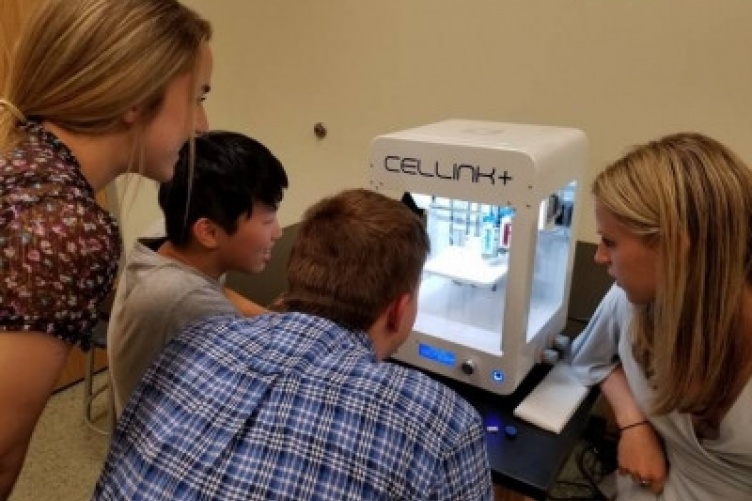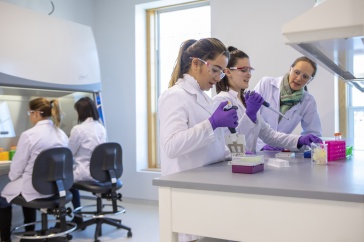
The Manchester Millyard has become the hub for conversation around biofabrication since the creation of the Advanced Regenerative Manufacturing Institute (ARMI) and BioFabUSA, part of the Manufacturing USA network.
As part of its efforts to support ARMI|BioFabUSA, the University of New Hampshire at Manchester is sparking interest in the emerging field by offering an Introduction to Biotech Manufacturing course to New Hampshire high school students. The flexible, online class begins October 1 with students from Bow, Laconia, Londonderry, Kearsarge, Nashua, Pinkerton, Salem, Winnacunnet and Windham high schools in attendance.
Introduction to Biotech Manufacturing explores the terminology and practices of the biotechnology industry while emphasizing the business, regulatory, legal and scientific foundations in today’s commercial and government sectors. The course is taught by prominent STEM educator Carolyn Kelley, who led the development of biotechnology education at the high school level for the state of New Hampshire and has been nationally recognized for her leadership role in public education.
Mike Decelle, dean of UNH Manchester and chief workforce officer for ARMI’s EWD efforts, said the course brings students and industry together, which is key to building early interest in the cutting-edge fields of biotechnology and bioengineering.
“Courses like these act as catalyst for engaging younger students in the biosciences manufacturing sector, which is positioned to change lives,” Decelle said. “Students have the opportunity to learn from leaders in the industry and see what it’s like to work in this emerging field.”
The biofabrication industry combines biology-related research, computer science, materials science and engineering to create an industry for engineered tissue manufacturing, which will restore form, function and appearance to wounded soldiers and reduce the waiting time for organ transplant patients. Kyle MacLea, assistant professor of biotechnology, said the course was revamped with support from ARMI|BioFabUSA curriculum funding to align more closely with the institute’s initiatives.
“The course was redesigned by working with experts on biotechnology products, which helped expand the biotech products covered in the course, giving students a much greater understanding of the full range of innovations happening in the industry today,” MacLea said. “Students now learn about all aspects of these biotech products, from how we make them to how they are regulated, marketed and studied.”
In addition to building a solid foundation for high school students to understand the wider needs and impact of biomanufacturing, the Introduction to Biotech Manufacturing course provides unique access into the knowledge and experience of ARMI|BioFabUSA members and partners in the regenerative medicine and tissue engineering fields. Getting students interested in the subject early is key to building the industry’s workforce, said Maureen Toohey, deputy director at ARMI|BioFabUSA.
“We are very pleased to see these ideas and foundational education seeded at a very early age,” Toohey said. “My experience with STEM programs has taught me that the earlier a student learns new concepts, the more likely she or he will internalize the skills as their own and go on to consider a future career in the field.”
Leveraging the attention and interest that ARMI|BioFabUSA has brought to the biotechnology field, UNH Manchester is actively expanding its teaching and research facilities. MacLea said he anticipates the college will add more courses and equipment in the areas of bioengineering and cellular biology in the near future.
“As the biomanufacturing sector grows, the need for passionate, skilled and innovative workers will grow with it,” MacLea said. “We’re helping to prepare that workforce by sparking interest in the field early, connecting students with industry experts and offering hands-on research opportunities.”



















































